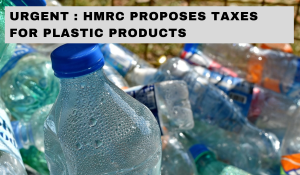
BHETA has written to Government outlining its strong objections to last minute additions to the draft Plastic Packaging tax legislation. Specifically, the sudden late-stage extension of the scope of the legislation to include consumer goods as well as packaging.
The draft legislation on plastic packaging – which says that all packaging which is not at least 30% made from recycled plastic is subject to tax levies – has been in consultation for some time, but in a conference call on 11th December, HMRC informed the Joint Trading Associations, including BHETA, that it will be including plastic consumer goods in the scope of the new law. Both plastic buckets and plastic storage boxes were explicitly stated as being included in the tax, but a full list was not provided, meaning items such as wheelbarrows, plant pots, lunchboxes, water bottles and many other similar items may be included.
Under the new Plastic Packaging legislation, from April 2022 all plastic items used in the packaging of products must include a minimum of 30% recycled content, or face taxes of £200 per metric tonne of chargeable plastic packaging components.
BHETA’s Chief Operating Officer, Will Jones said, “The overall trajectory towards a more sustainable world is not disputed but if it is to progress, it must be via a responsibly managed process. Suddenly adding new criteria to proposed legislation in which we have all been consulting at this late stage is just not acceptable.
“When this draft legislation was made public for consultation, it was made very clear that the tax framework that was conceived, and previously presented, as a measure ‘to encourage the use of recycled plastic … within packaging.’ Suddenly adding consumer products into the scope of the proposed laws in December and asking for final feedback by 7th January is unreasonable and irresponsible, both in terms of the timeframe and the significant impact of the proposed change.”
Will Jones continued, “The product examples given are manufactured to high quality standards, have been designed to meet specific functional needs and are usually kept by the consumer for many years. They can in no way be classed as packaging. This is not only an issue for suppliers, but will become an issue for consumers, when the increased costs inherent in categorising consumer goods as taxable in the same way as packaging are passed on through the supply chain, which will inevitably be the case.
“On behalf of its members, BHETA is asking the Government to respond urgently by firstly removing all consumer products from the plastic packaging tax legislation, and secondly by extending the deadline for feedback.”
BHETA regularly lobbies on subjects affecting housewares, small electricals, DIY and garden members. It also provides member training and retail networking events, up to the minute data on market opportunities compliance advice. To find out more, contact Nicola Adams at the BHETA Member Services Team on 07946 078566, or alternatively, email on na@bheta.co.uk.
These buttons take you to the Government’s published documents:-
VIEW THE DRAFT LEGISLATION
VIEW THE GOVERNMENT POLICY PAPER
VIEW SUMMARY OF RESPONSES TO CONSULTATION
Here are some key extracts from the document, “summary of the responses to the consultation” showing how HMRC has changed its thinking since the consultation:
2.14 The government has decided that packaging-type products that do not fulfil a packaging function until they are used by the end consumer will be included in the tax. The government maintains that this will be simpler for businesses to administer than accounting for these products separately to other equivalent packaging at the point of production or import. The government recognises that this is different to the current Packaging Producer Responsibility (commonly 8 referred to as ‘Packaging Recovery Note’, hereafter ‘PRN’) obligations, but also that differences between the design of the tax and the PRN obligations mean that a different approach is required. For example, the tax will have quarterly reporting periods compared to the longer time businesses have to determine product use and report their annual PRN obligations.
2.15 The government has also decided not to exclude plastic packaging items that could also be characterised as longer-term storage items due to the difficulties in distinguishing between them and other types of packaging at the point of manufacture or import. It is also the case that their use as storage items is not always certain when they are sold to the users and inclusion in the tax will encourage more recycled content to be included in these products.
2.16 By having products that do not fulfil a packaging function until they are used by the end consumer within the scope of the tax, the government recognises there is a need to avoid capturing products which are not plastic packaging but could otherwise fall within the definition as they complete some form of containment, protection, handling, delivery and/or presentation function, e.g. plastic trunking to contain wires or a plastic handbag. The government will introduce legislation clarifying where plastic packaging intended for use by a consumer will be in the scope of the tax. Further illustrations of this will be provided in guidance to help taxpayers understand their obligations.
